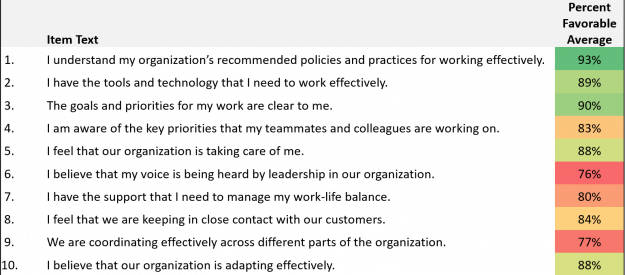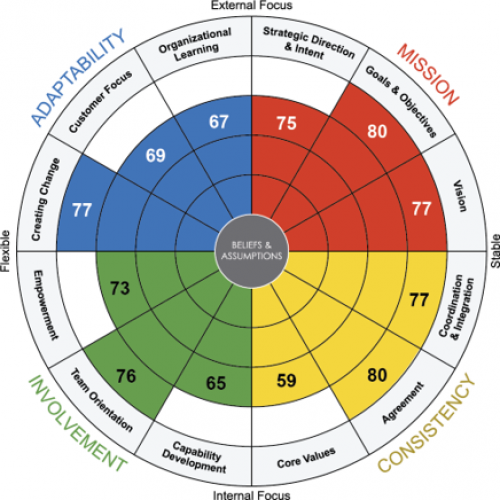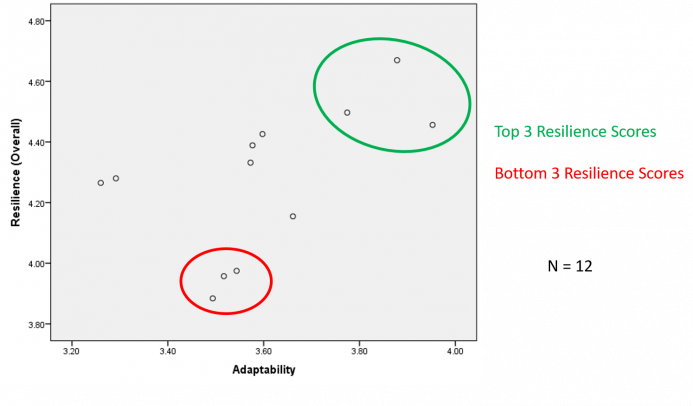How are Your People Responding to the Pandemic?
Building on a Culture of Adaptability
By Dr. Daniel R. Denison (Founding Partner, Chairman) and Michael G. Schwendeman (Director of Research & Development)
Over these past few months, as the world of work has been disrupted like never before, many of our colleagues have stepped forward to do research on how companies are adapting to the COVID-19 Pandemic. As organizations struggle to keep their people safe, adjust to working from home, and accommodate the massive changes in the business environment, these results have helped us provide useful information to guide their actions. We’re proud to have been able to help!
We’ve now done projects with 30 to 40 of our clients these past two months and these have shown us some interesting patterns that we want to share with you through a series of articles & posts. This article focuses on how an organization’s culture can influence an organization’s response to the pandemic.
We designed a set of questions to learn more about companies’ responses to the pandemic. We were very pleased, but a little surprised when we saw how positive the responses were. With results from 4554 individuals in the first 24 organizations, the results are shown on the right:
There are some valuable lessons here. Overall, people seem to understand their organization’s policies & practices, and feel that they have the tools and technologies that they need to do their work.

They also understand their goals, and are aware of the activities of their colleagues and teammates. They keep in close contact with their customers, and feel that their organization is adapting effectively and taking care of them. More than 80% replied positively to these questions. As you can see from these results, people were somewhat less favorable in their responses about their voices being heard, and about coordinating effectively across the organization. But overall, these are still very favorable responses, nearly 30 points higher than we typically see for the average culture survey item, which range from around 40% to 75% favorable responses. This confirms that most of the organizations that we’ve surveyed are very resilient and are doing an admirable job of responding to pandemic. We’re grateful to them for the example that they set!
But we also started to wonder how the underlying culture of the organization influenced the resilience responses. So, we looked at 12 of the organizations for which we had both the resilience data and our organizational culture data. This table shows the percentile scores on our 12 indexes for the sample of firms that took our resilience survey. As you can see, the sample of firms that took our survey are well-above average. If the scores were all 50th percentile, that would mean that the sample of resilience firms was a representative sample of firms.
So, our research shows that most of the companies that have chosen to do our resilience assessment were not average – they are mostly organizations that have very positive cultures to begin with, and their response to the pandemic has been a reflection of that positive culture. It is also very interesting that the most significant cultural strengths of the high resilience firms are a high level of agreement, and a clear set of goals and objectives.

We were actually a little surprised to see that the firms who took our resilience survey were not especially high on Core Values – that was actually the lowest culture score with a percentile score of 59.
When you compare organizations’ responses on our culture trait of adaptability to their response on our resilience assessment, the pattern is clear. Adaptability and resilience go hand in hand. There are a couple of outliers that had average resilience scores, even though they were fairly low on adaptability, but there weren’t any organizations that had a high level of resilience without a strong culture of adaptability.

Lessons for Leaders
We are encouraged by the way that companies around the world have risen to the challenge to protect their people, their customers, and their businesses. We are heartened by all of the great examples of innovative ideas that have emerged as we adapt to this new world.
As our research shows, the foundation of a resilient response to crisis is a strong underlying culture of adaptability. Organizations with the most positive cultures appear to have the best response. But the challenge goes far deeper:
- After an initial quick response, how do organizations sustain their resilience?
- For companies who have less favorable cultures, how can they develop a resilient response that helps them build for the future?
- As people go back into their offices, how do organizations maintain their resilience, and adjust to a “new normal” that just keeps shifting?
Listen. Although the first round of rapid adjustments driven by principled and compassionate leaders has been difficult, the next stage of responding to the crisis will probably be even harder. Listening to your people can be very challenging especially when the situation is constantly changing. Every organization needs to establish a method where they keep in touch with the evolving needs of their people. And it is harder to listen and adapt to all of the variety of support needs that people have than it is to implement top-down decisions.
Bounce Forward, not Back. Our colleagues Richard Citrin and Michael Couch always encourage their clients to stop talking about “bouncing back” and start talking about “bouncing forward.” There is no going back. The #1 priority of every organization should be re-inventing all of the characteristics that made your company great so that they can work effectively in this new environment. It’s not easy, and it can require significant restructuring and transformation, but it definitely can be done – we are watching a number of organizations do that right now!
Governance & Coordination. Most of our traditional methods of managing & coordinating seemed to disappear overnight in late March 2020! What will replace them? The organizational systems we have designed over the years to govern, coordinate, and make decisions will all need to be replaced by virtual systems that operate with little direct human contact. We may have made 5 years progress in the last two or three months, but there still is a lot of work to do. Informal interaction at work is always one of the best ways to discover what you “don’t know.” But in a virtual environment, that is all gone. All of the informal coordination systems that hold organizations together need to be replaced by virtual systems. It’s an exciting and challenging time as we get to recreate our organizations for the future.
Habits & Routines. Culture change occurs when big picture priorities get aligned with the thousands of habits and routines that structure our everyday behavior. How many of your habits have changed in the last few months? How many more habits & routines will need to change as we work our way through the pandemic and emerge into a new world on the other side? Aligning individual behaviors with organizational objectives always takes leadership and this work is never done.
We’ll keep you posted as the findings from our research keep coming out. This article is just the start, and we will continue to help our clients as they work their way through the challenges that we all face. Stay safe and stay strong and keep in touch!
Read more of Denison Consulting’s Transform articles here.
If you would like support in this process, please be in contact with us. We can help you achieve transformation right to the bottom line.
Subscribe to Denison insights
Keep up to date with new TRANSFORM articles or research, by subscribing here.
[gravityform id=”2″ title=”false” description=”true”]





